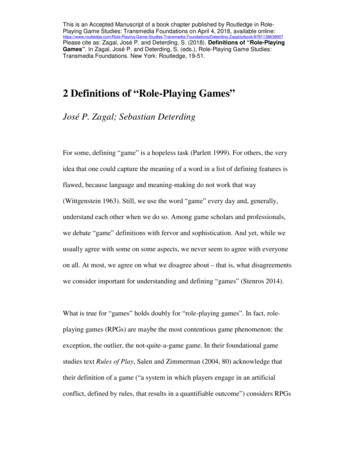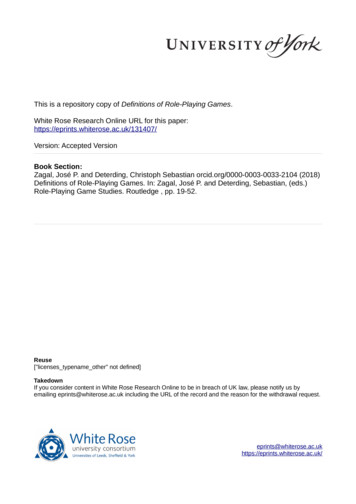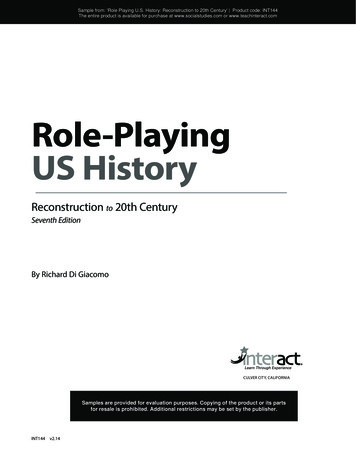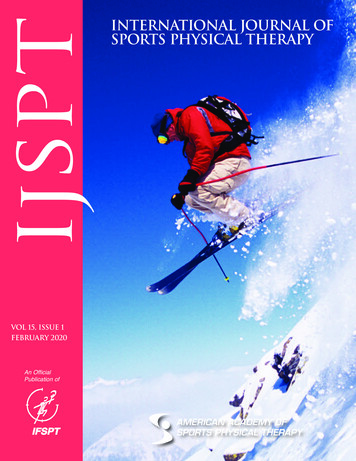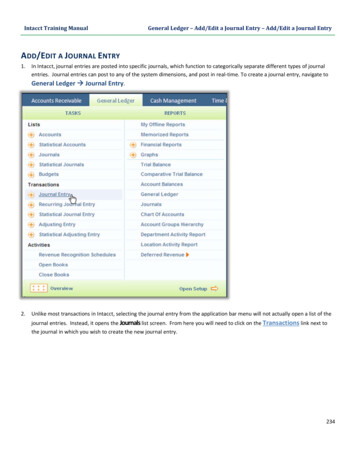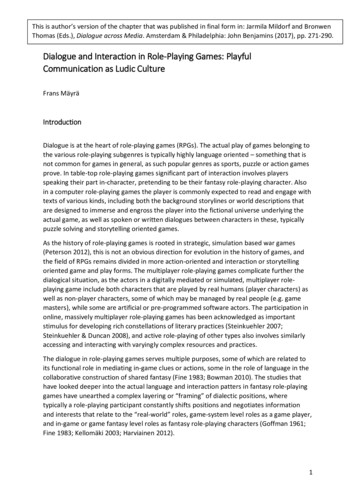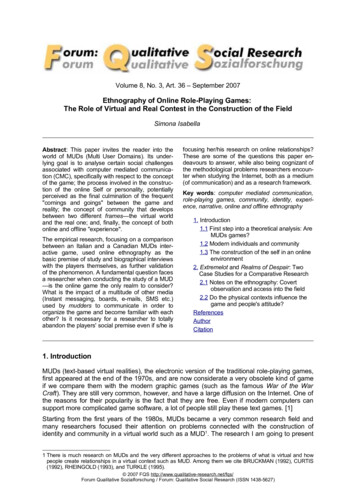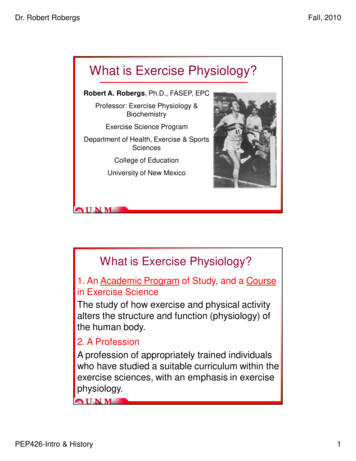
Transcription
International Journal ofRole-PlayingThe aim of the International Journal of Role-Playing is toact as a hybrid knowledge network, bringing together thevaried interests in role-playing from its associatedknowledge networks, e.g. academic research, games,creative industries, the arts, and role-playing communities.EditorialSpecial Issue:Role-playing andSimulation in EducationThis special issue containsnine articles chosen fromamongst those presented atthe Role-playing andSimulation in EducationConference at Texas StateUniversity in Round Rock,Texas, May 19, 2016.Sarah Lynne Bowman 3-6We Need to Talk: ALiterature Review ofDebriefEnhancing HealthcareSimulations and Beyond:Immersion Theory andPracticeThis literature review consults the diverse academicdefinitions of debriefing togive context to larp debriefs.Simulation learning andpsychological debriefing areexplored to show lessonsand precedents.Brodie AtwaterScaffolding Role-Playing:An Analysis of Interactionswith Non Role-players ofAll Ages7-11This paper applies six majorcategories of immersiontheory to health caresimulation: immersion intoactivity, game, environment,narrative, character, andcommunity.Sarah Lynne Bowman andAnne Standiford12-19Arts-Based Inquiry with ArtEducators throughAmerican FreeformThis article explores therelationship between natureand culture during a seriesof scaffolded larp activitiesdesigned as part of a STEAMsummer program forindigenous youth.Summarizing dissertationresearch, this articlefocuses on the creation of acommunity of play formedwith professional and preservice art educators byusing a series of Americanfreeform games.Gabriel de los Angeles20-26Jason Cox27-31
International Journal ofRole-PlayingThe aim of the International Journal of Role-Playing is toact as a hybrid knowledge network, bringing together thevaried interests in role-playing from its associatedknowledge networks, e.g. academic research, games,creative industries, the arts, and role-playing communities.Physical Presence inSimulation: A Scratch atthe Surface of ComplexityPlaying Political Science:Leveraging Game Designin the Post-SecondaryClassroomSimulation and CharacterOwnership in SecondaryDramatic LiteratureEducationThis article examinesthe impact of physicalpresence on simulation andeducational gaming. Thismeta-review of existingresearch reveals centralissues involved in deployingphysical simulations.This paper describes thefirst implementation ofgamification and gamebased learning in a PoliticalScience classroom at thepost-secondary level basedupon Sheldon and Bartle.This case study examinesthe effectiveness ofincorporating role-playingtechniques into a highschool classroom in order toimprove student’s masteryof the themes and structureof an American play.J. Tuomas Harviainen 32-38Mikael HellströmOne Way to CreateEducational GamesImprov games, whichare used to train actors inhow to do improvisationaltheatre, may be used totrain other professions aswell. The games assist in thedevelopment of simple skillsand also give context for theskills’ use.Graham MacLean51-5439-45Josh T. JordanTeaching GermanLiterature Through Larp:A PropositionGames can be used tointerpret literature incomparable ways to ananalytic essay. This articlediscusses two nano-gamesbased on German literaturedeveloped by University ofCincinnati students.Evan Torner55-5946-50
International Journal of Role-Playing - Issue 6EditorialSpecial Issue: Role-Playing and Simulation in EducationWelcome to Issue 6 of the International Journal ofRole-Playing.This issue focuses on one of the more importanttopics in the field of role-play studies: educationalrole-playing, or edu-larp. Edu-larp is closely alignedwith other forms of experiential learning, includingsimulation, drama in education, psychodrama,improvisation, game-based learning, etc. (Mochocki2014; Bowman, 2014; Bowman and Standiford,2015). Indeed, learning through role-taking andplaying scenarios is an instinctive part of the humanexperience, as evidence by our proclivity towardpretend play (Bowman 2010). Although not all playis productive (Stenros, 2015), using games and roleplaying as a means of instruction holds a tremendousamount of potential to increase engagement andmotivation.Along these lines, interest in educational roleplaying has increased dramatically in the last severaldecades, from practitioners to researchers (cf.Simulation & Gaming; Henriksen, 2004, 2006, 2008;Andresen, 2012; Bowman, 2014; Simkins 2015). Edularp, which evolved from leisure role-playing as aform of experiential learning, is expanding rapidlyas a supplemental teaching method in classroomsand other learning spaces. Edu-larp is even theprimary teaching method at the Danish boardingschool Østerskov Efterskole, which is celebratingits tenth successful year of operation in 2016. Due tothis increased interest in the method, several officialconferences have emerged to discuss the practicaland academic aspects of edu-larp, including theRole-playing in Games Seminar (2012) in Finland, theLiving Games Conference (2014) in New York, theEdu-larp Sweden Conference (2014) in Gothenburg,the Edu-larp CPH conference (2015) in Denmark,and the Edularp Conference (2016) in Finland. Thisclassroom (2015), as she is an accomplished researcherand practitioner who straddles both the simulationand larp worlds (Standiford 2014). Standifordteaches clinical and psychiatric nursing at the St.David’s School of Nursing at Texas State University,which offers students an elaborate simulation lab,complete with a mock hospital, clinic rooms, and simdolls. Texas State had consulted with both edu-larpspecialist Aaron Vanek and myself for assistance withintegrating larp techniques into their simulations inthe last few years. I have also volunteered for themas both a simulated patient and doctor for severalsemesters. Therefore, this location served as anexcellent space to hold the conference, which tookplace on May 19, 2016, with much support from thefaculty and staff of the School of Nursing.The results of this event were twenty-twoexceptional presentations on the theoretical andpractical applications of experiential learning froma variety of perspectives: Simulation and HealthCare; Humanities; Natural and Political Sciences;Sociology, Psychology, and Therapy; Businessand Other Professional Applications; and YouthOutreach. These presentations are all available intheir entirety on the Role-playing in Simulationin Education Hub (2016) hosted on the LivingGames website, including videos of each talk andtheir accompanying Powerpoint presentations.In conjunction with the conference, we invitedparticipants to submit short papers on their topics,which underwent peer review. Thus, this sixth issueof the International Journal of Role-playing features aselection of nine papers resulting from this work, coedited by Evan Torner and me.As the conference was hosted by a departmentspecializing in simulation, we invited J. TuomasHarviainen to deliver a keynote bridging the gapbetween simulation and larp entitled “PhysicalPresence in Simulation: A Scratch at the Surface ofComplexity.” His accompanying paper provides ameta-review of the existing literature on presence,simulation, and larp, discussing the importance ofcareful attention to the components of physicality,briefings, and debriefings in the successfuldeployment of these interventions.In a similar vein, in “Enhancing HealthcareSimulations and Beyond: Immersion Theory andPractice,” Standiford and I reviewed the literaturearound the contested topic of immersion. Wesynthesized this information into six major categoriessimilar to those developed by Gordon Calleja(2011): immersion into activity, game, environment,narrative, character, and community. Standifordand I then applied these categories to health caresimulations, analyzing how effectively existingexercises engage students on each of these levels andidentifying areas for improvement.3
International Journal of Role-Playing - Issue 6Transitioning to the more expansive category of theHumanities, this issue offers four excellent papers onthe application of edu-larp. In “Arts-Based Inquirywith Art Educators through American Freeform,”Jason Cox offers a summary of his dissertationproject, which involved developing and deployingoriginal freeform scenarios as training tools in highereducation pedagogy. Evan Torner’s “TeachingGerman Literature through Larp: A Proposition”also explores edu-larp in the higher educationclassroom, but takes a different approach. In thispaper, Torner explains how he incentivized collegestudents to develop freeform scenarios by adaptingclassic German literature texts.One of our major goals for the conference was tomake the various theories and practices aroundedu-larp accessible to the larger community. Wealso hoped to bridge the gap between edu-larp andother sibling practices in order to share insightsbetween related fields. We hope that these papersand the accompanying video documentation of thepresentations will help inspire others to begin oradvance their own work in this growing, fascinatingfield of pedagogy.Similarly, others presenters focused upon the use oflarp, simulation, and improvisational techniques asa way to stimulate student interest in learning. JoshT. Jordan’s “Simulation and Character Ownership inSecondary Dramatic Literature Education” discussesutilizing larp and simulation techniques to help highschool students more deeply connect with charactersin classical theatre texts. While Jordan’s workemphasizes scripted materials, Graham MacLean’s“One Way to Create Educational Games” exploresthe use of improvisational theatre methods in theclassroom as an innovative way to build upon theexisting skills students possess through the use ofspontaneous creativity.REFERENCESIn contrast, the last three papers focus on morescientific content within edu-larps, as well asthe application of social science theories. BrodieAtwater’s “We Need to Talk: A Literature Reviewof Debrief” presents an overview of the concept ofdebriefing in various contexts, including simulation,clinical psychology, and larp. This work untanglesthe various definitions of the term, working to clarifythe importance of properly deployed debriefing ineach of these fields, with an emphasis on the uniquepurpose behind the larp debrief.With an eye more toward practice, Mikael Hellström’s,“Playing Political Science: Leveraging Game Designin the Post-Secondary Classroom” explains how theauthor applied gamification and game-based learningstrategies garnered from role-playing theory to thehigher education political science classroom. Finally,Gabriel de los Angeles’ “Scaffolding Role Playing:An Analysis of Role-playing Interactions with NonRole-players of All Ages” describes the applicationof educational psychology and larp theory to edularps designed for indigenous children to increaseengagement with science and the arts. These exerciseswork to provide an experiential method of connectingecological knowledge with indigenous tradition andinter-generational community building.Sarah Lynne BowmanAustin Community CollegeAndresen, Martin Eckhoff. 2012. “BringingFiction Alive: An Introduction forEducation and Recreation.” In Playing theLearning Game: A Practical Introduction toEducational Roleplaying, edited by MartinEckoff Andresen, 10-19. Oslo, Norway:Fantasiforbundet.Atwater, Brodie. 2016. “We Need to Talk: ALiterature Review of Debrief.” InternationalJournal of Role-playing 6: 7-11.Bowman, Sarah Lynne. 2010. The Functions of RolePlaying Games: How Participants CreateCommunity, Solve Problems, and ExploreIdentity. Jefferson, NC: McFarland &Company, Inc.———. 2014. “Educational Live Action Role-playing Games: A Secondary LiteratureReview.” In The Wyrd Con Companion Book2014, edited by Sarah Lynne Bowman, 112131. Los Angeles, CA: Wyrd Con.Bowman, Sarah Lynne, and Anne Standiford. 2015.“Enhancing Healthcare Simulations andBeyond: Immersion Theory and Practice.”International Journal of Role-playing 5: 12-19.———. 2016. “Enhancing Healthcare Simulationsand Beyond: Immersion Theory andPractice.” International Journal of Role-playing6: 4-25.De los Angeles, Gabriel. 2016. “Scaffolding RolePlaying: An Analysis of Role-playingInteractions with Non Role-players of AllAges.” International Journal of Role-playing 6:20-26.4
International Journal of Role-Playing - Issue 6Calleja, Gordon. 2011. In-Game: From Immersion toIncorporation. Cambridge, MA: MIT Press.Cox, Jason. 2016. “Arts-Based Inquiry with ArtEducators through American Freeform.”International Journal of Role-playing 6: 27-31.Game to Grow. 2016. YouTube. Modified November18. FiKreQHarviainen. J. Tuomas. 2016. “Physical Presencein Simulation: A Scratch at the Surface ofComplexity.” International Journal of Roleplaying 6: 32-38.Hellström, Mikael. 2016. “Playing Political Science:Leveraging Game Design in the PostSecondary Classroom.” International Journalof Role-playing 6: 39-45.Henriksen, Thomas Duus. 2004. “On theTransmutation of Educational Role-play: ACritical Reframing to the Role-play in Orderto Meet the Educational Demands.” InBeyond Role and Play: Tools, Toys, and Theoryfor Harnessing the Imagination, edited byMarkus Montola and Jaakko Stenros, 107130. Helsinki, Finland: Ropecon ry.———. 2006. “Games and Creativity Learning.”In Role, Play, Art: Collected Experiences ofRole-Playing, edited by Thorbiörn Fritzonand Tobias Wrigstad, 3-16. Stockholm:Föreningen Knutpunkt.Mochocki, Michał. 2013. “Edu-Larp as Revisionof Subject-Matter Knowledge.” TheInternational Journal of Role-Playing 4: 55-75.“Role-playing and Simulation in EducationConference Hub.” Living Games.Modified May 25, 2016. le for Role-playing and Simulation inEducation Conference.” Living Games.Modified January 12, 2016. Simkins, David. 2015. The Arts of Larp: Design,Literacy, Learning and Community in LiveAction Role-Play. Jefferson, NC: McFarland.Standiford, Anne. 2014. “Lessons Learned fromLarp: Promoting High-Quality Role-playand Immersion in Nursing Simulation.” InThe Wyrd Con Companion Book 2014, editedby Sarah Lynne Bowman. Los Angeles, CA:Wyrd Con.Stenros, Jaakko. 2015. Playfulness, Play, and Games: AConstructionist Ludology Approach. PhD Diss.Finland: University of Tampere.Torner, Evan. 2016. “Teaching German LiteratureThrough Larp: A Proposition.” InternationalJournal of Role-playing 6: 55-59.———. 2008. “Extending Experiences of LearningGames: Or Why Learning Games Should BeNeither Fun, Educational Nor Realistic.” InExtending Experiences: Structure, Analysis andDesign of Computer Game Player Experience,edited by Olli Leino, Hanna Wirman, andAmyris Fernandez, 140-162. Rovaniemi,Finland: Lapland University Press.Jordan, Josh T. 2016. “Simulation and CharacterOwnership in Secondary DramaticLiterature Education.” International Journalof Role-playing 6: 46-50.MacLean, Graham. 2016. “One Way to CreateEducational Games.” International Journal ofRole-playing 6: 51-54.5
International Journal of Role-Playing - Issue 6Executive Editor, IJRPWilliam J. WhiteProduction Editor, IJRPMarinka Copier, Coordinating EditorSarah Lynne Bowman, LayoutSpecial Issue Editorial BoardSarah Lynne Bowman, Coordinating EditorEvan Torner, Coordinating EditorEmily Care BossAnne StandifordSpecial Issue Review BoardBrodie AtwaterRyan BlackstockDarrin CoeJason CoxSteven DashiellGabriel de los AngelesJason GiardinoJ. Tuomas HarviainenMikael HellströmTim HutchingsJosh T. JordanAnna V. KonovalenkoDiana J. LeonardTiMar LongGraham MacLeanNicholas MizerJason MorningstarHawke RobinsonRebecca RoycroftDavid SimkinsAnne StandifordSamara Hayley SteeleEvan TornerSusan WeinerWilliam J. WhiteJamie WilkinsonJose Zagal6
International Journal of Role-Playing - Issue 6We Need to Talk: A Literature Review of DebriefPopular abstract: This literature review consults the diverse academic definitions of debriefing to give context to larpdebriefs. Among the many concepts for debriefing, simulation learning and psychological debriefing are explored to showlessons and precedents. Simulation debriefs emphasize learning and a transition from the affective to the cognitive, which caninform how larp debriefs engage with content. The concepts of fidelity and authenticity, along with tripartite learning withinsimulations, are invoked to show similarities and potential growth for larp debriefs. Psychological debriefing has mixed results,but reviewing the literature shows that psychological debrief practice within research has been functionally dissimilar to larpdebrief. Discourse already surrounding psychological debrief has questioned the research methods and results of previousstudies, making generalization to larp debriefs inappropriate. Larp-specific debriefs are considered non-therapeutic transitionaltools for moving between perspectives and reinstalling the social reality suspended during play. Its counterpart, workshopping,is considered important to creating the necessary context for debriefing. Larp debriefs have the potential to become a vector forthe therapeutic work through larping. The article advocates for responsible content creation despite using debrief as a transitionaltool, as no evidence suggests that debriefing makes larping safer.Brodie AtwaterGoddard Collegebrodie.atwater@gmail.com1. INTRODUCTIONThis paper is a review of contemporary literatureon debriefing, a reflective practice that follows liveaction roleplay (larp). Its methods, purpose, andeven effectiveness have become topics of concernamong those interested in progressing the disciplineof live-action into one that produces intense contentand leaves its participants unharmed. Discourse ondebriefing extends beyond larp. Its foundationaltheories exist in psychodrama (Browne 2005), disasterintervention (O’Brien, Mill, Fraser, and Anderssen2011), simulation learning (Garris, Ahlers, Driskell2002), trauma recovery (Littleton and Breitkopf 2006),group therapy (Yalom and Leszcz 2005), play therapy(Higgins-Klein 2013), psychology research (HumanSciences Research Council 1997), and militaryoperations (Adler, Castro, and McGurk 2009).Psychological debriefing and simulation literaturehold specific insights. The sources reviewed in thiswork span several fields of study in order to clarifythe terms, form, and purpose of debriefing in larp.2. RESOURCES CONSULTEDCollecting resources for this review included onlinelarp publications, like the Nordiclarp.org website andlarp theorists’ personal websites, as well as the worksof larp scholars included in the catalog of Knutepunktand WyrdCon Companion Book literature. Researchextended to the EBSCO and JSTOR databases forrelevant works on debrief, role-play, psychologicalfirst aid, trauma processing, psychodrama, andsimulation. Though lessons exist in all literaturewithin the scope of the search, the inclusion criteriasought practices that create a period of review,reflection, and processing immediately following anevent in order to focus on the precedents andprospects of established larp debriefing procedure.The literature reviewed is English-only and fruitfulresources in other languages may have beenexcluded.3. DIVERSE DEFINITIONSPeripheral literature concerns debriefing as a toolwith diverse intentions. Singularly, debrief is a periodof clarification following a complex event. Its variousincarnations are used to consolidate learning, reflecton automatic thinking, express emotions, addressbehavioral patterns, identify consequences, sharesocial reality, reduce psychological symptoms, buildcommunity, and reinstate a previously-suspendedsocial reality.Relevant fields of study begin with Jacob Moreno.Moreno has been recognized in larp studies ascreating the term “role-playing” (Fatland 2014).His methods of psychodrama and sociodrama areritual practices of spontaneous interaction that areincomplete without facilitated reflection on theorigins and outcomes of events within the ritual(Browne 2005). Sociodrama specifically addresseshow the reality contextualizing a sociodramaticritual can be changed from the lessons articulatedthrough role-play. Larp stands to take influencefrom the simulated social realities of sociodrama.Acknowledging the integrated reflection of Moreno’stoolkit, in which a conventional sense of reality isreimposed and lessons are forged in review, showsthe precedent for debrief within role-play.Simulation learning, like Moreno’s work, imposes atemporary reality to inspire authentic reactions. Thesespaces can recreate events unsafe or uncommon,7
International Journal of Role-Playing - Issue 6like disaster scenarios or medical emergencies,in order to practice critical behaviors and inducesituational learning. Debriefing is foundationalto simulation learning as a period of informationconstruction (Garris, Ahlers, and Driskell 2002).Facilitated debriefs bring an expert opinion toparticipant experiences in order to evaluate reactions;address inconsistencies between the simulateddiegesis and larger reality; and create expectationsfor situations outside of a classroom (Dreifurst 2009).Critical incident stress management (CISM) uses adebriefing practice following simulated catastrophicevents to share information, identify support,normalize reactions, and screen individuals at riskof psychological trauma (O’Brien, Mill, Fraser,and Anderssen 2009). Psychological first aid is apractice developed from WWII military debriefingprocedures that the American Red Cross uses toaddress victims of natural disasters (Snider, VanOmmeren, and Schafer 2011). Group and playtherapies, which rely on spontaneous enactment toanalyze behavior, use reflection techniques outsideof spontaneous content in order to address patterns(Higgins-Klein 2013; Yalom and Leszcz 2005).Psychological experiments use debriefing techniquesto disclose the intention of a research scenario andreturn subjects to a state of comfort and trust (HumanSciences Research Council 1997). These proceduresoffer precedents to current debrief techniques,alternatives for developing larp-specific debriefing,and critical literature on the effectiveness andpurpose of debriefing a period of liminal disruption.4. RELEVANCE TO SIMULATION DEBRIEFSimulation debriefing is similar to larp debriefsin form, although has the purpose of constructivelearning rather than affective processing. Simulationlearning aims to recreate a situation that feels realto the participant. These situations have reducedconsequences compared to non-simulated events,allowing the learner to see the effects of their actionsand engage a scenario with literal thinking andpresence. The tripartite domains of learning featuredin simulation learning -- cognitive, affective, andpsychomotor – are both integral to Moreno’s workand substantiated in larp research (Sternberg &Garcia 2000; Bowman 2013a).Two concepts exist in simulation literature that arebeneficial for larp discourse. Fidelity is a feature ofsimulations meant to mirror a real-world setting(Standiford 2014). The degree of fidelity a simulationhas is a reflection of the literal scenario it mirrors, withgreater fidelity meaning a more lifelike enactment.For example, in a firefighting demonstration, actualfire would be a high fidelity element. Complementingfidelity is authenticity, the discussed feeling on thepart of the participant that the situation is real.Nursing scenarios that use actors for patients havethe aim of authentic feeling.Simulation debriefing reviews the automaticenactment of participants in order to createexperiential learning. Kolb’s theory of knowledgestates that it emerges from doing an action, reflectingon the action, creating an idea about how it happened,and then testing the idea against diverse conditions(Kolb & Whishaw 2014). Conceptually, reflectionencourages self-correction, objective feedback,genealogies of automatic thought, and correlationwith theory (Dreifuerst 2009). Dreifuerst attributesthese six phases to the model educational debrief: The procedure and rules of the debrief areacknowledged outright; Discussion begins with open-ended questionsabout participants’ emotions; Discussion turns to questions about quality andimprovement; Individual events are reviewed with aconceptual framework; Participants are presented with a summary ofkey points; A hypothetical scenario with different premisesis presented to anticipate new challenges andtest learned material. (2009)Simulation debrief procedure is mediated by anexpert teacher. The simulation is prefaced withlearning goals. Reflection in simulation is coachedby the facilitator to yield learning in three steps:awareness, critical analysis, and then a newperspective. This procedure is constructivist, asknowledge is constructed by an individual as theylearn. Creating knowledge is achieved throughframing, an attribution of knowledge to information.Executive thinking, as an aspect of dual-processtheory, contextualizes behavior and encouragescorrective action following from the stimulationthat engages automatic thinking (Baimel, Severson,Baron and Birch 2015). Simulation debriefing createsthe safety and separation to think on the actionsone has taken in order to anticipate later reactions.8
International Journal of Role-Playing - Issue 65. SIMILARITY TO PSYCHOLOGICAL DEBRIEF6. DEBRIEFING IN LARPPsychological debriefing and practices sharingsimilar effects hold expectations between educationaland emotional review. Largely, research findings onemotionally-focused debriefing have not shown itpositively. Bastos, Furuta, Small, McKenzie-McHarg,and Bick’s study of postpartum debriefing (2015)have shown no evidence for or against the practice.Alexander, Bannister, Bisson, and Jenkins’ 1997study results showed that individual debriefing forburn victims lead to poorer outcomes. Rose, Bisson,Churchill, and Wessely (2009) also showed resultsthat individual debriefing with trauma victimswithin a month of exposure lead to poorer resiliencefor PTSD.Larping is primarily concerned with players’ feelings(Burns 2014). Larp debrief shares this focus. Alignedwith tripartite domains of learning, larp combinescognitive skills (maintaining diegetic reality) withpsychomotor capabilities (individual embodiment)in order to elicit affective engagement (Bowman2014b). Dual-process theory considers the first tobe an executive skill and the second and third to beautomatic, intuitive processes (Baimel, Severson,Baron, and Birch 2015). The executive maintainsa coherent narrative of a fictional world whileautomatic processes engage with sensory material.Though subject to critique, these theoretical modelsoffer an explanation of how a larp scenario can resultin a fictional reality that creates authentic feelings ina participant.The burn victim study is often held as an exampleof improper procedure, as the latency of treatmentwas greater than traditional debriefing and thetreatment was conducted individually (Tuckey2007). Adler, Castro, and McGurk (2009) claimthat poorly conducted studies have skewed theperceived effectiveness of psychological debrief andhalted practice due to cautious obligation againstpotential harm. Small-sample studies have sustainedpsychological debriefing as standard practice inthe American military (Adler, Castro, and McGurk2009). Tuckey cites this contention and advocatesfor reformed debrief research methods (2007). Thediscourse places psychological debriefing and similarpractices, like psychological first aid, seeming at astandstill for research. Efficacy research is uncommondue to the associated risks, although debriefing isstill practiced due to peer-reviewed expert advocacy(Tuckey 2007; Snider, Van Ommeren, and Schafer2011).The observed negative effects of psychologicaldebriefing are not appropriate for generalizing to larpdebriefing. The studies involving Bisson (Alexander,Bisson, Bannister, and Jenkins 1997; Rose, Bisson,Churchill and Wessely 2002) are respectively astudy with burn victims and a literature review.These are the studies that show a harmful potentialto debriefing. Both concern individual debriefingprocessed in the days after a traumatic event. Thisis unlike larp debrief, which takes places in a groupimmediately following an enactment. Larp debriefmore closely resembles group therapy, an effectivepractice with a precedent for peer leadership (Yalom& Leszcz 2005), than the debriefing techniquesanalyzed in these studies. Torner and Bowmansuggest that the events within role-play are morelikely triggering previous traumatic experiencesrather than creating fresh trauma (2014).As larp is social, the constructs and content of a diegeticworld are reified by each participant’s executiveintention and automatic reactions collaborating toform a separate social reality. The effects of thesescenarios can feel very real, especially when an eventlasts for multiple days or includes intense content(Torner and Bowman 2014). Debriefing is a measuretaken to ensure that the consequences of life-likebehavior do not spill into life.Larp-specific debrief discourse holds that discussionfollowing an event is beneficial, even necessary,primarily for thorough emotional processing.This concept of bleed, emotional spillover betweencharacter and player, is the paramount concern ofthe discourse (Montola 2010). Bleed is not alwaysnegative, but an effect of intense content. Intensityoften means effort to a degree uncommon orunpleasant outside of the safe space of play. Theconditions of safety necessary for play are weakenedin play involving heavy bleed (Montola 2010).Addressing bleed by recontextualizing a playerfollowing intense content is the apparent purpose ofdebrief within the reviewed literature.Methods of conducting debriefing all share acomponent of instilling social support in exchangefor the or
Role-Playing The aim of the International Journal of Role-Playing is to act as a hybrid knowledge network, bringing together the varied interests in role-playing from its associated knowledge networks, e.g. academic research, games, creative industries, the arts, and role-playing communities. Physical Presence in Simulation: A Scratch at


